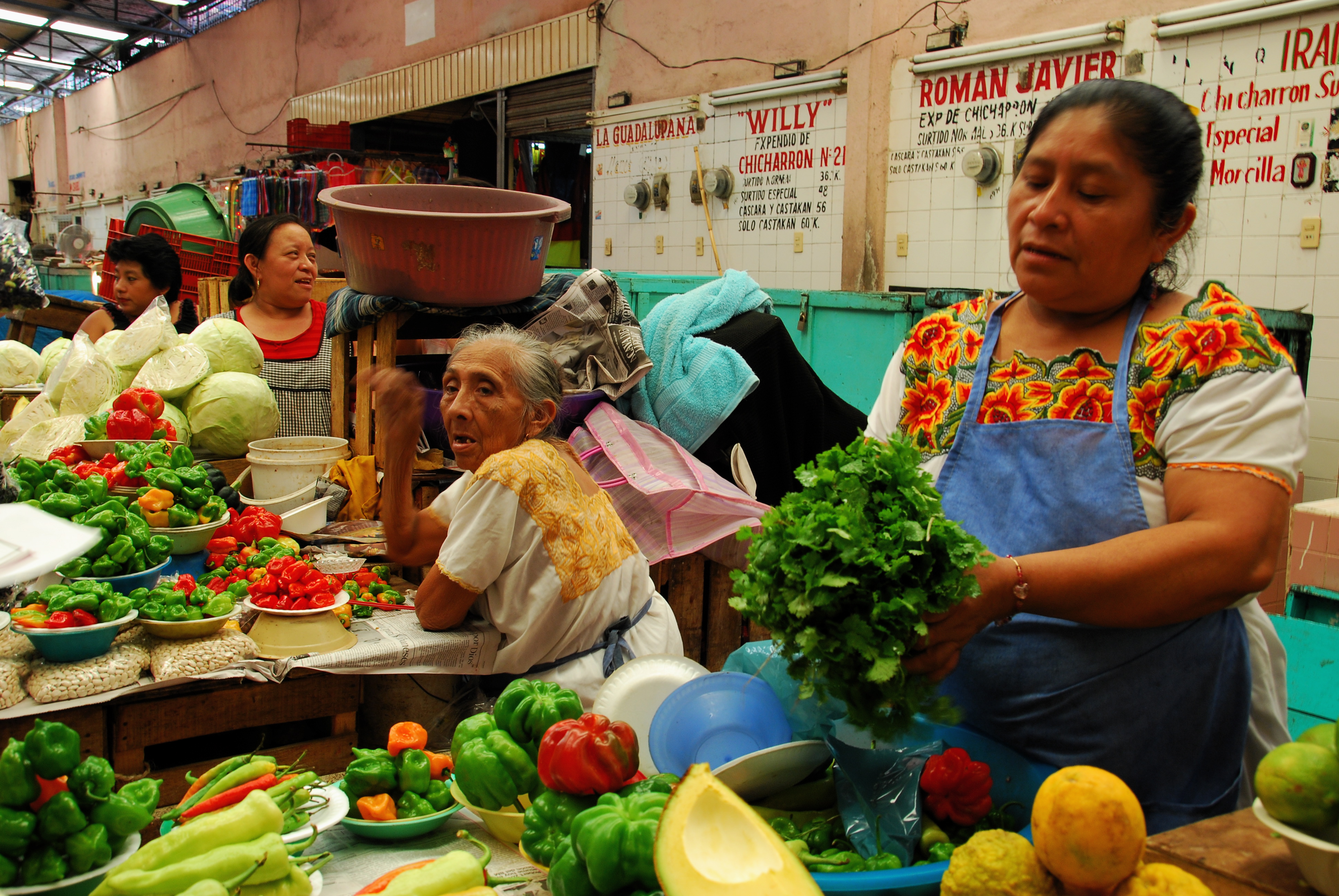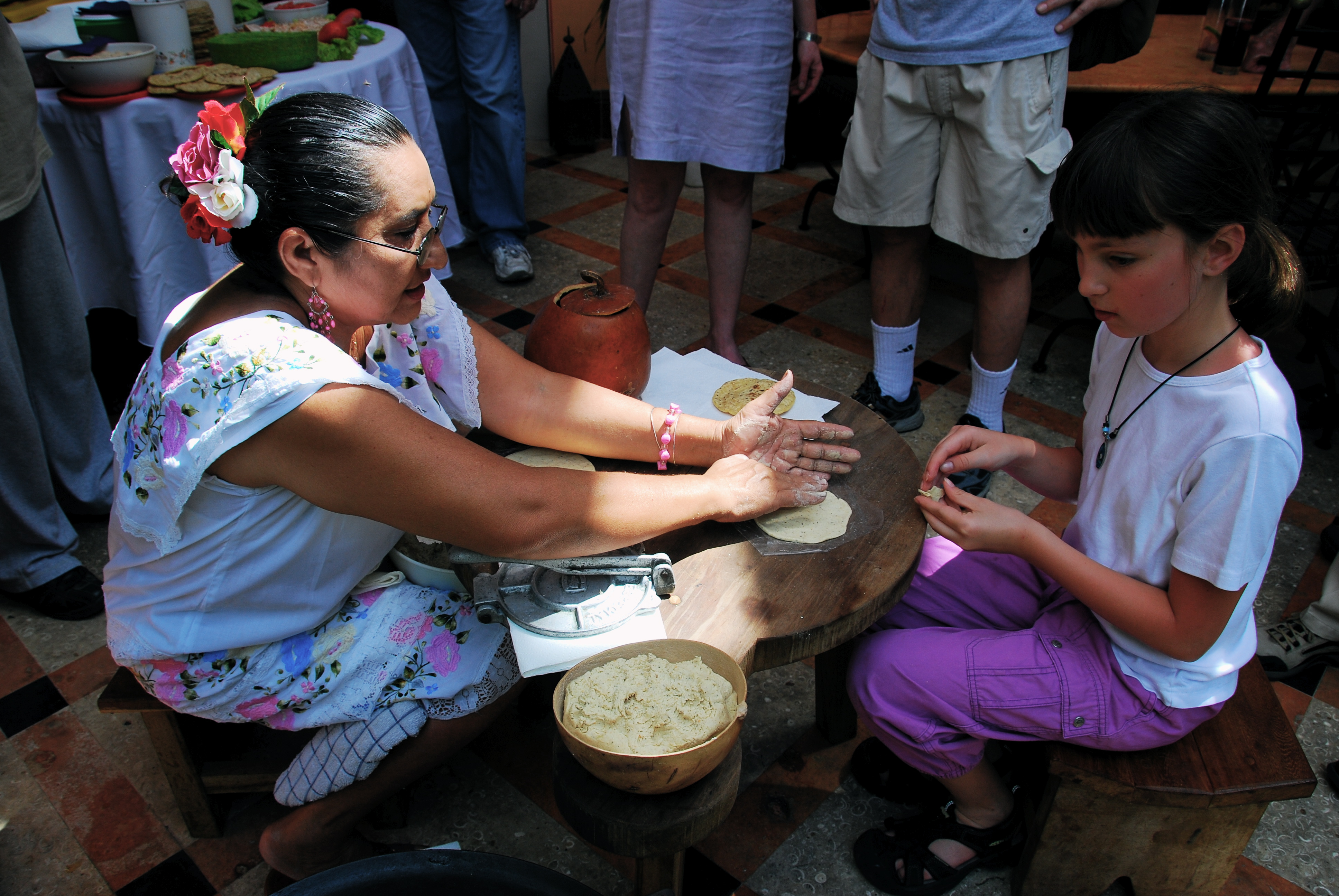It’s a challenge finding the best Yucatan cooking after 6 p.m. Even Merida’s Lebanese colony honors local rituals. In the Yucatan, lunch – at 2 or 3 – is the big meal of the day. Supper may be soup or a light snack, most likely at home. Thus baba ganouj and kibbe connections shut down after lunch.
But in the past decade, with the descent of tourists and ex-pats on Social Security or seeking a simpler life, dozens of restaurants have moved in to feed the transients, transplanted Americans and Europeans, and sophisticated locals with a yearning for dinner on a north of the border timetable. Domino’s delivers and so does the German deli and even the local mom and pop pizza parlor three blocks from our house on Calle 55.
The same names crop up on every gourmand’s recommended list. At night there is La Trotto (for pizza and pasta) and Trotter’s (no kin to Charlie) for steak or a Kobe burger. Nectar, with its modish weirdnesses and first family following, exists to feed night crawlers. A certain kind of traveler will always thank God for Thank God It’s Friday.
That’s how – after confirming everywhere we wanted to go had closed at sunset – we come to settle on the roof of Pancho’s last Monday. “It’s awfully kitsch,” warns our ex-pat guide, a transplanted New Yorker. “They make the waiters wear big straw sombreros. And they stand on each other’s shoulders to pour flaming drinks. But it has a wonderful view of the cathedral from the roof. And the food is pretty good.”
Indeed, a casual passerby might not guess there is a roof garden and could settle in oblivious to the fact that just beyond the t-shirt counter, near-paradise is just a few steps up: palms and bamboo, a moon above, cool breezes, the pale yellow illuminated towers of the cathedral across the way and painted on two walls: a masked man with the legend “Marcos eats here when he’s in town.” (Marcos, the hero of Yucatan separatism.) The white-clad waiters with criss-crossed bandoliers dash about smiling under those wide straw hats, toting heavy trays from the kitchen below. Ours is movie star handsome, cuter than Brad used to be, and doesn’t seem to know it as he rushes us the house’s gift with purchase: fried plantains and a smoky tomato dipping sauce.
The margaritas may be a little scant but they’re delicious, no stinting on the tequila. And I’m an easy drunk, three sips and I’m feeling it. Having nixed the house floor shows -- shrimp or pepper steak flamed tableside -- I’m in gringo heaven sharing the $18.50 “Mexican combination” with the Road Food Warrior. It’s a wonderfully excessively stuffed platter, two of all the menu’s “Fritangas”: beef tenderloin tip stuffed quesadillas, a pair of corn tortilla sopes with chorizo and beans, a couple of wild mushroom empanadas and two panuchos, the adored snack of Yucatan on a fried tortilla: black bean stuffed with adobo chicken or turkey strips overflowing with pickled onion. Most of it is surprisingly good, except the soggy, over-cheesed sopes and it’s definitely dinner for me. Still, I’m happy to taste Steven’s shrimp tacos “pastor style” with its tangy salsa and fresh pineapple to wrap in soft tortillas.
Everyone around our table seems happy, sharing tastes of the feta-tossed cactus salad, chaya and spinach dip with artichokes, poblano-corn-spinach-stuffed chicken breast with Oaxacan mole and a lamb stew wrapped in “maguey” leaves, entrees $10.50 and up, $32.50 (for a bone-in-rib eye with truffle oil). Nobody really wants dessert but we decide to try the apple-almond tart with five forks (tenedores) just to prolong the pleasure of our terrace perch, the live music on a lower level, the lights lowering and all eyes turned for each acrobatic alcoholic flaming of coffee (a mini Cirque du Soleil for just $6). The giggles. The cool breezes. The bottom half of a moon. The fleeting fantasy that I might tempt the adorable waiter to emigrate or at least to stop by my hacienda so we can discuss it. Anyway, now I know now why Pancho’s terrace is crowded with locals and gringos as midnight nears.
529 Calle 59 between 60 and 62nd Streets. 923 0942. Merida.
***
Pyramids and Mastering the Art of Tortillas
 |
|
Ek’Balam has surprises half way up steep stairs. Photo: Steven Richter
|
It’s not that we’re rigid about a light lunch although I notice that lunches in upper class homes served by staff can start at 3-ish and go on for hours, pretty much obliterating thoughts of dinner. Mostly we’re not in Merida at lunch time. We’re on the road, exploring the ruins in restoration, monuments and pyramids. It’s an 190 kilometer drive to Ek’ Balam (fast on the toll road). There this pre-Hispanic religious center, dating from 300 B.C., protected by a series of three walls, is still so newly restored and relatively less visited that we are allowed to climb the steep stairs where archeologists have left the carvings protected by thatched awnings.
One morning I join a dozen students, mostly Americans, sipping orange juice and frosted breakfast cakes at Los Dos Cooking School where the introduction to Yucatan cooking begins with a lecture by David Sterling, a designer ex-pat escapee from New York, in his strikingly tiled kitchen – a mix of Andalusia and Mexico.

|
|
The market ladies wait for Los Dos teacher Sterling. Photo: Steven Richter
|
Before making the big break from America, Sterling commuted. Now in just six years he has become Yucatanese. “We do not grow lemons,” he will say, meaning we Yucatanese. And he sets out his habanera salsa for the students to taste with a bowl of crema “for the wusses in the crowd.” Then we’re off to the big Mercado Lucas Galvez, striding to keep up with Sterling, each student carrying a tote and a shopping list. “This is my Williams-Sonoma,” he says, clearly moved by the exquisite fruits and the Technicolor of hot peppers and vendors calling out to him. “Remind me if I seem to be forgetting anything,” he says dropping a jumbo batch of banana leaves into someone’s plaid plastic tote.
He halts the group around a small display where a man is selling plastic bags filled with a mix of cooked white beans, ground pumpkin seed, onions and cilantro – “This is my ambrosia,” Sterling confides. “”We’ll use it to stuff our polkanes. (Corn meal paste shaped like a rattlesnake head.) You can make your own mix or buy it already made. I usually manage to eat half of it while I’m cooking.”
 |
Students get a chance to mimic Doña Soco’s tortilla moves. Photo: Steven Richter.
|
Taxis wait outside the market to return us to Los Dos where two Mayan women, Doña Soco, long pink earrings dangling for emphasis, and her daughter, Mariela, are already patting out tortillas on the terrace beside the pool. Each student can take a turn sitting in front of Doña Soco to mimic her movements. Smoothing and stretching the dough is easy enough, getting that crisp little edge is an art. As the two women start frying, we move into the kitchen. In no time Sterling has students squeezing sour oranges to pickle raw onions and standing over the stove blistering the chiles that will make a torrid salsa.
Steven and I stay to taste our salbutes and panuchos – Yucatan’s open face tacos with or without black bean paste inside, topped with slivers of chicken or turkey and a thatch of that pickled onion. As we leave, Sterling is bustling off to Act 2 of his day, corralling the students to make crema de cilantro soup, chicken steamed in banana leaf with green rice and fried plantanas with sorbetes de frutas tropicales.
If you’re heading to Merida, you’ll want to give yourself a day or two at Los Dos in the spell of Sterling’s passion for the Yucatan. “What I like about the Mayans,” he says, apropos of their discovery of vanilla, “Is that they’ll eat anything.”
***